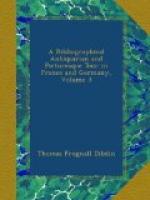Let me pursue this amusing strain; for I have rarely, within so small a space—in any monastic library I have hitherto visited—found such a sprinkling of classical volumes. Plinius Senior, 1472. Folio. Printed by Jenson. A prodigiously fine, large copy. A ms. note, prefixed, says: “hunc librum comparuit Jacobus Pemperl pro viij t d. an [14]88,” &c. Xenophontis Cyropaedia. Lat. Curante Philelpho. With the date of the translation, 1467. A very fine copy of a well printed book. Mammotrectus, 1470. Folio. Printed by Schoeffher. A fine, white, tall copy; in its original wooden binding. Sti. Jeronimi Epistolae. 1470. Folio. Printed by Sweynheym and Pannartz. In one volume: for size and condition probably unrivalled. In its first binding of wood. Gratiani Decretales. 1472. Folio. Printed by Schoeffher. UPON VELLUM: in one enormous folio volume, and in an unrivalled state of perfection. Perhaps, upon the whole, the finest vellum Schoeffher in existence. It is in its original binding, but some of the leaves are loose. Opus Consiliorum I. de Calderi. 1472. Idem Opus: Anthonii de Burtrio. 1472. Folio. Each work printed by Adam Rot, Metensis: a rare printer, but of whose performances I have now seen a good number of specimens. These works are in one volume, and the present is a fine sound copy. Petri Lombardi Quat. Lib. Sentent. Folio. This book is without name of printer or date; but I should conjecture it to be executed in Eggesteyn’s largest gothic character, and, from a ms. memorandum at the end, we are quite sure that the book was printed in 1471 at latest. The memorandum is as follows: “Iste liber est magistri Leonardi Fruman de Hyersaw, 1471.”
Such appeared to me to be the choicer, and more to be desiderated, volumes in the monastic library of Closterneuberg—which a visit of about a couple of hours only enabled me to examine. I say “desiderated”—my good friend—because, on returning home, I revolved within myself what might be done with propriety towards the possession of them.[156] Having thanked the worthy librarian, and expressed the very great satisfaction afforded me by a sight of the books in question—which had fully answered the high character given of them—I returned to the auberge—dined with an increased appetite in consequence of such a sight—and, picking up a “white stone,” as a lucky omen, being at the very extent of my Bibliographical, Antiquarian, and Picturesque Tour—returned to Vienna, to a late cup of tea; well satisfied, in every respect, with this most agreeable excursion.




